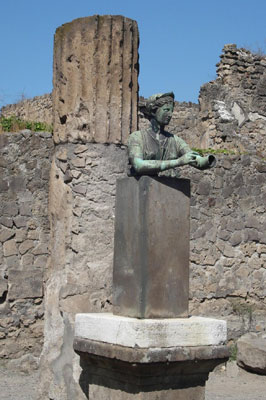A. Diana and Actaeon
 LIKE the Sun-god, whom men dreaded as the divine archer and loved as the divine singer, Diana, his sister, had two natures, as different as day from night.
LIKE the Sun-god, whom men dreaded as the divine archer and loved as the divine singer, Diana, his sister, had two natures, as different as day from night.
On earth she delighted in the wild life of the chase, keeping holiday among the dryads, and hunting with all those nymphs that loved the boyish pastime. She and her maidens shunned the fellowship of men and would not hear of marriage, for they disdained all household arts; and there are countless tales of their cruelty to suitors.
Syrinx and Atalanta were of their company, and Arethusa, who was changed into a fountain and ever pursued by Alpheus the river-god, till at last the two were united. There was Daphne, too, who disdained the love of Apollo himself, and would never listen to a word of his suit, but fled like Syrinx, and prayed like Syrinx for escape; but Daphne was changed into a fair laurel-tree, held sacred by Apollo forever after.
All these maidens were as untamed and free of heart as the wild creatures they loved to hunt, and whoever molested them did so at his peril. None dared trespass in the home of Diana and her nymphs, not even the riotous fauns and satyrs who were heedless enough to go a-swimming in the river Styx, if they had cared to venture near such a dismal place. But the maiden goddess laid a spell on their unruly wits, even as the moon controls the tides of the sea. Her precincts were holy. There was one man, however, whose ill-timed curiosity brought heavy punishment on him. This was Actaeon, a grandson of the great king Cadmus.
Wearied with hunting, one noon, he left his comrades and idled through the forest perhaps to spy on those woodland deities of whom he had heard. Chance brought him to the very grove where Diana and her nymphs were wont to bathe. He followed the bright thread of the brook, never turning aside, though mortal reverence should have warned him that the place was for gods. The air was wondrous clear and sweet; a throng of fair trees drooped their branches in the way, and from a sheltered grotto beyond fell a mingled sound of laughter and running waters. But Actaeon would not turn back. Roughly pushing aside the laurel branches that hid the entrance of the cave, he looked in, startling Diana and her maidens. In an instant a splash of water shut his eyes, and the goddess, reading his churlish thought, said: "Go now, if thou wilt, and boast of this intrusion."
He turned to go, but a stupid bewilderment had fallen on him. He looked back to speak, and could not. He put his hand to his head, and felt antlers branching above his forehead. Down he fell on hands and feet; these likewise changed. The poor offender! Crouching by the brook that he had followed, he looked in, and saw nothing but the image of a stag, bending to drink, as only that morning he had seen the creature they had come out to kill. With an impulse of terror he fled away, faster than he had ever run before, crashing through bush and bracken, the noise of his own flight ever after him like an enemy.
Suddenly he heard the blast of a horn close by, then the baying of hounds. His comrades, who had rested and were ready for the chase, made after him. This time he was their prey. He tried to call and could not. His antlers caught in the branches, his breath came with pain, and the dogs were on him,—his own dogs!
With all the eagerness that he had often praised in them, they fell on him, knowing not their own master. And so he perished, hunter and hunted.
Only the goddess of the chase could have devised so terrible a revenge.
B. Diana and Endymion
But with the daylight, all of Diana's joy in the wild life of the woods seemed to fade.
By night, as goddess of the moon, she watched over the sleep of the earth, — measured the tides of the ocean, and went across the wide path of heaven, slow and fair to see. And although she bore her emblem of the bow, like a silver crescent, she was never terrible, but beneficent and lovely.
Indeed, there was once a young shepherd, Endymion, who used to lead his flocks high up the slopes of Mount Latmos to the purer air; and there, while the sheep browsed, he spent his days and nights dreaming on the solitary uplands. He was a beautiful youth and very lonely. Looking down one night from the heavens near by and as lonely as he, Diana saw him, and her heart was moved to tenderness for his weariness and solitude. She cast a spell of sleep on him, with eternal youth, white and untroubled as moonlight. And there, night after night, she watched his sheep for him, like any peasant maid who wanders slowly through the pastures after the flocks, spinning white flax from her distaff as she goes, alone and quite content.
Endymion dreamed such beautiful dreams as come only to happy poets. Even when he woke, life held no care for him, but he seemed to walk in a light that was for him alone. And all this time, just as the sun god watched over the sheep of King Admetus, Diana kept the flocks of Endymion, but it was for love's sake.